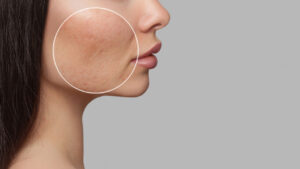The best remedies for dark patches on skin
Dark marks, often referred to as hyperpigmentation or dark patches on the skin, are a common skin concern that can affect anyone. These spots can diminish the skin’s natural radiance whether caused by sun exposure, hormonal changes, or aging. They occur when certain areas of the skin produce more melanin, the pigment that gives skin its color. These patches can vary in size and can appear anywhere on the body.
Common areas for dark patches
Dark patches on skin, or hyperpigmentation, can appear on various body parts, but some areas are more commonly affected.
Face
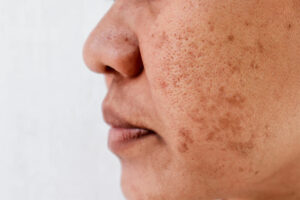
The cheeks, forehead, upper lip, and nose are common areas, especially in cases of melasma or sun spots. Dark patches on the face are very common due to its high exposure to sunlight and the delicate nature of its skin. Dark spots, hormonal changes, and post-inflammatory hyperpigmentation can all contribute to the face’s uneven skin tone and discoloration.
Hands
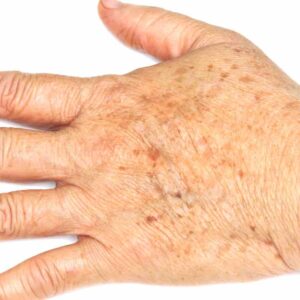
The hands are frequently exposed to environmental aggressors, including UV rays and pollutants. The skin on the hands is thinner, making it more prone to hyperpigmentation from sunspots and age spots.
Chest
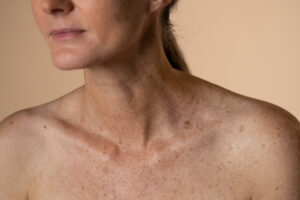
The delicate skin of the chest is frequently exposed to the sun, making it susceptible to dark spots. Low-cut clothing and the cumulative effects of sun exposure over time contribute to the development of dark spots in this area.
Back
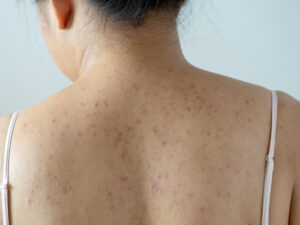
The skin on the back can be sensitive to friction, clothing, and environmental factors, making it prone to skin trauma and acne. This can lead to post-inflammatory hyperpigmentation and the formation of dark spots.
Neck
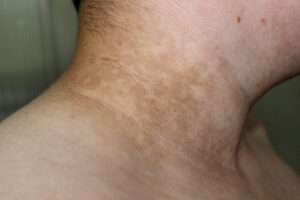
Dark patches, particularly around the back of the neck, can result from sun damage or acanthosis nigricans, a condition related to insulin resistance or hormonal disorders.
Legs
Hyperpigmentation can occur on the lower legs, often from post-inflammatory hyperpigmentation following bug bites, cuts, or skin conditions like eczema.
Top treatments to erase dark patches on skin
Cosmelan peel
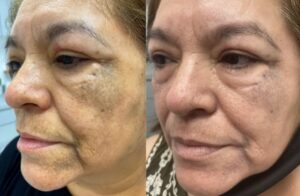
The Cosmelan peel is a powerful depigmentation treatment designed to eliminate dark patches on skin and control melanin production, helping to prevent their recurrence. Melanin is the pigment responsible for skin color, and excessive production can lead to conditions like hyperpigmentation and melasma. This chemical peel blocks the enzyme tyrosinase, which plays a key role in melanin synthesis. As a result, the treatment effectively reduces hyperpigmentation and promotes a more even skin tone.
Benefits of Cosmelan peel for dark patches
- Effective for different types of dark patches on skin
Cosmelan can treat a variety of pigmentation issues, including melasma, sunspots, and post-inflammatory hyperpigmentation. - Works on all skin types
Unlike some treatments, Cosmelan is safe and effective for all skin tones, including darker skin types. - Long-lasting results
When combined with the proper at-home care, Cosmelan treatments offer long-lasting reduction of dark spots. - Minimal downtime
While some peeling, redness, or flaking may occur in the days following the peel, the downtime is generally minimal compared to other peels.
What to expect
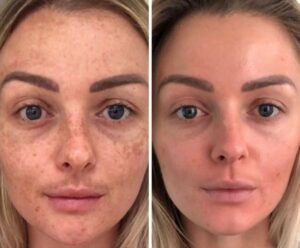
In the first week after the peel, expect some peeling, redness, and dryness as your skin sheds its outer layer. You’ll start to see noticeable results in about 2 to 3 weeks, with more even skin tone and reduced dark patches on skin. With proper follow-up care and maintenance, results continue to improve over the following months.
Cosmelan peel offers a highly effective solution for treating dark patches on skin, helping to brighten and rejuvenate the complexion with minimal downtime.
Chemical peel
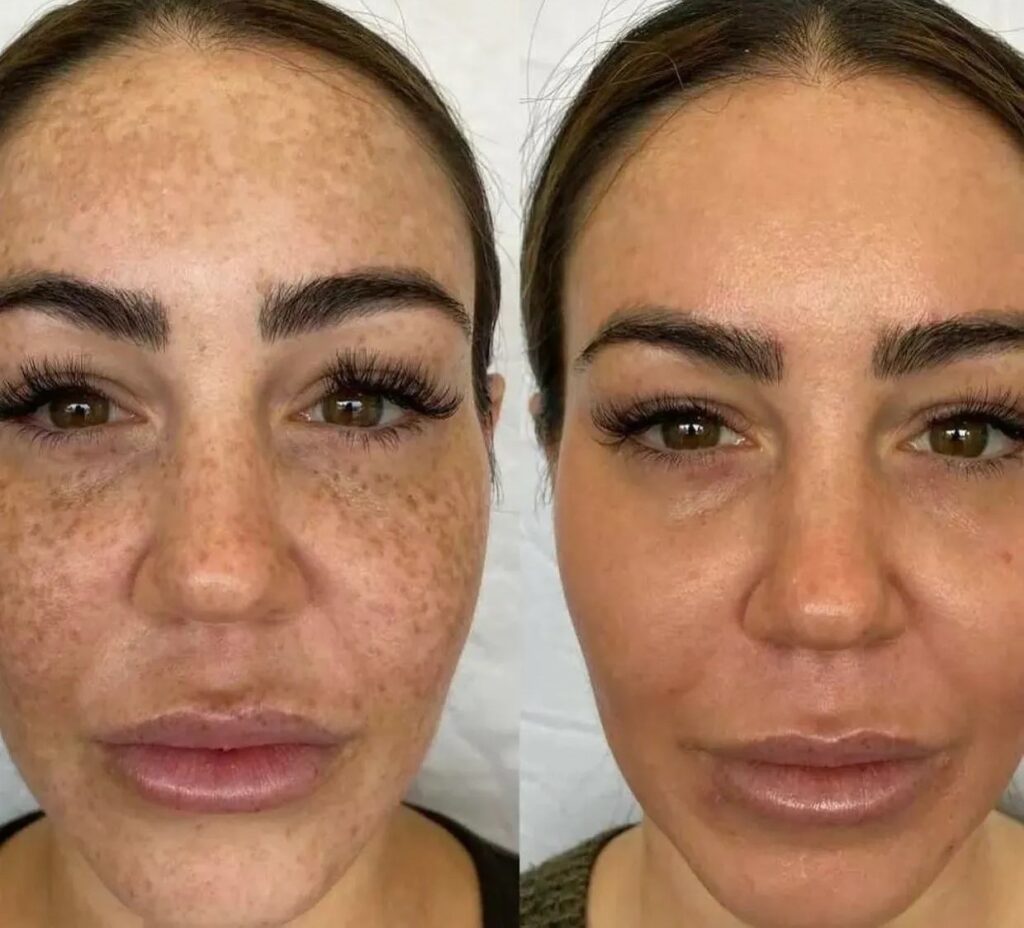
A chemical peel is a popular and effective treatment for addressing dark patches on skin, such as hyperpigmentation, melasma, sunspots, and post-inflammatory marks. Chemical peels exfoliate the skin’s outer layers, encourage cell turnover, and reveal fresh, more evenly toned skin underneath. Depending on the severity of the pigmentation, different types of chemical peels may be used. The chemical solution may contain one or more components: salicylic acid, lactic acid, glycolic acid, trichloroacetic acid, or phenol. The type of chemical peel that is used depends on the patient’s skin type and desired results.
When applied to the skin, the chemical solution creates a controlled burning effect, eliminating brown spots and other discoloration from the skin’s outer layers. This process also promotes the growth of new skin cells, helping the skin heal more quickly and appear more even in tone.
Benefits of Chemical peel for dark patches
- Reduced hyperpigmentation
Chemical peels lighten dark spots by removing the outer layer of skin where excess pigmentation accumulates. - Improved skin texture
Peels smooth and rejuvenate the skin, giving it a more youthful appearance. - Even skin tone
Regular chemical peels can lead to a more balanced and even complexion. - Customizable
Chemical peels can be tailored to your specific skin concerns and severity of pigmentation.
What to expect
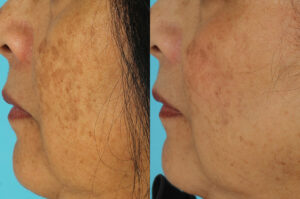
After a chemical peel, the skin renews itself, causing some redness, peeling, and flaking. You’ll start to notice improvements within a few days to weeks, depending on the type of peel. Depending on the severity of dark patches, multiple sessions may be required to achieve optimal results.
Chemical peels are an excellent option for treating dark patches on the skin, with various types available to match the severity of the pigmentation issue. Regular treatments, combined with proper aftercare can help achieve smoother, more radiant, and evenly toned skin.
These treatments work by exfoliating the skin and inhibiting melanin production, leading to an even skin tone and a brighter complexion. Cosmelan peels provide targeted action against stubborn pigmentation, while chemical peels vary in strength to address different levels of discoloration. With the right treatment plan, tailored to individual skin types and concerns, patients can achieve significant improvement in their skin’s appearance.




